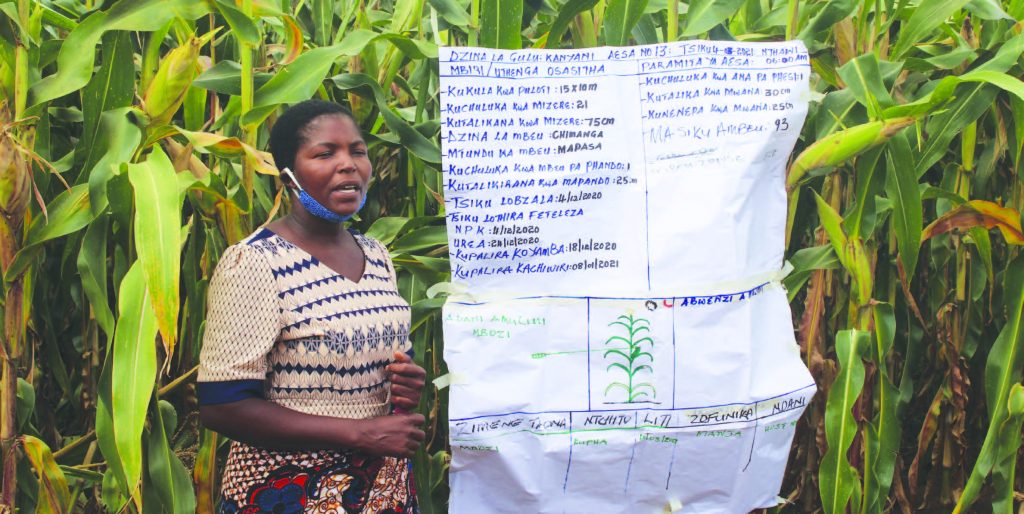Studying towards ending hunger
Standing close to a maize field, Grace Joseph, with the aid of a flip chart, confidently explains how smallholder farmers are finally finding solutions to poor harvests.
During the 2020/2021 agriculture season, the 38-year-old and 29 other smallholder farmers in Mola Village, Chiradzulu District identified three study plots to assess the impact of fertiliser application on maize yields.

“On the first plot, we applied inorganic fertiliser while controlling all other factors,” says Joseph, a leader of the farmers group.
On the second plot, the group applied both organic and inorganic fertiliser, and did not apply any fertiliser on the third plot.
The results, says Joseph, are speaking for themselves.
“As you can see, the results are clearly indicating that the plot where we applied both organic and inorganic fertiliser has impressive results with a maize cob measuring 30cm and 25cm in length and width respectively,” she explains.
“The plot where we applied only inorganic fertiliser has maize cobs of 27cm and 15cm measurement whereas the plot without any fertiliser has cobs of 16cm and 12cm measurement.”
Some four kilometres from Mola Village, another group of smallholder farmers in Chimtengo Village, Traditional Authority Kadewere is singing and dancing as they lead officials from the Ministry of Agriculture towards their study fields.
Explaining to the officials, Symon Steki, leader of the farmers group says: “At these plots, we wanted to differentiate results of crops planted using one seed per planting station and three seeds per planting station.
“As you can see, planting one seed per station has yielded healthier and bigger cobs than planting three seeds per station,” he says, attracting a rapturous applause from group members.
Both Joseph and Steki wish these studies came many seasons ago. The two rue the seasons they have been farming with limited access to extension services. Such a distant access to agricultural extension services, compounded by perennial hazards such as droughts, flooding and fall army worms, has contributed to a reduction in yields among farmers, they argue.
Their arguments are supported by the 2020 policy brief produced by Nasfam in partnership with ActionAid under the Partnership for Social Accountability project.
Titled Southern Africa on the brink of famine?, the brief decries Malawi government’s limited investment in agricultural extension services and blames it for partly contributing to food insecurity in the country.
The policy brief calls upon the government to, among others, conduct performance audits of agriculture extension services and assess their efficiency and effectiveness in capacitating smallholder farmers, especially women to sustainably contribute to realisation of food security goals in the region.
Joseph and Steki are community-based facilitators for Chisomo and Alinafe Farmer Field Schools (FFS) respectively, two of 1112 FFS spread across Chiradzulu District.
The structures are under a five-year European Union-funded Kutukula Ulimi m’Malawi and Better Extension Training Transforming Economic Returns, popularly known as Kulima-Better programme which is implemented in the country’s 10 districts with a target of 402 000 smallholder farmers.
The programme seeks to attain food, nutritional and income security for smallholders while strengthening their resilience in the face of climate change-related hazards.
The programme is implemented through a consortium of NGOs led by Self Help Africa. ActionAid Malawi, one of the implementing organisations, is running the project in Chiradzulu and Nkhata Bay with a target of 26 000 and 18 000 smallholders respectively.
ActionAid Malawi Kulima-Better project coordinator Greshan Kamnyamata says the field study using the Agro Eco-systems Analysis (AESA) is key in enabling farmers appreciate and adopt proven farming technologies to boost their yields and attain food security at household levels.
“The AESA does not look at manure or seed planting only. It also covers key areas such as pests and disease control, crop varieties and others. The same applies to livestock farming taking place under the project,” he says.
“All these studies are aimed at enabling the farmers to find answers to the questions they have as regards to farming. It is pleasing that since we started the project in 2018, there is now an increased adoption and upscale of the technologies among farmers.”
Ministry of Agriculture extension department deputy director Underson Chikomola hails smallholder farmers for taking interest in conducting studies to boost the yields.
“As a ministry, we are grateful to the Kulima-Better programme for empowering the smallholder farmers with agricultural technologies which could go a long way in attaining food security in the country.
“My appeal to the farmers is to ensure that they impart the knowledge to other farmers who are currently not under the farmer field schools,” he says.






One Comment